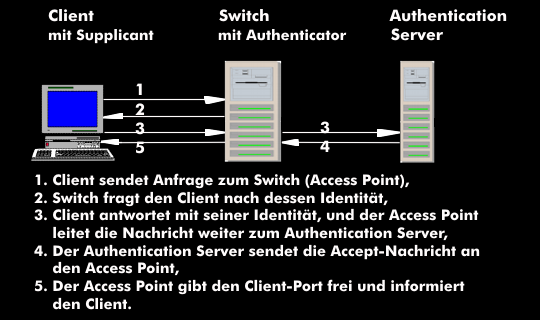IEEE 802.1x
The 802.1x standard is a port-based security concept in which attackers can only access the company network after they have authenticated themselves to a switch. It is a standardized authentication procedure that can be used in wired networks and in WLANs and with which access to the data network is precisely regulated.
The Port Based Network Access Control of 802.1x defines client- server basedaccess control and authentication and prevents unauthorized clients from connecting to a network through publicly accessible ports. Basically, nodes should first authenticate themselves to a switch before communicating with other network elements.
Generally, authentications occur between two partners or systems. On the one hand there is the requester, the supplicant, on the other hand the authenticated, the authenticator. The authentication is performed by the verifying Authentication Server( AS), whichverifies the supplicant's request and informs the authenticator. The supplicant is a software element in the client's operating system, and the authenticator is a network component such as a switch that controls and permits access to the infrastructure. The Authentication Server controls the communication of the end device and communicates with the Authenticator in the switch and is ultimately responsible for access.
The supplicant communicates with the authenticator using the Extensible Authentication Protocol( EAP), a Layer 2 protocol. The Authenticator continues to communicate with the Authentication Server via Remote Authentication Dial- In User Service( RADIUS). There is no direct communication between the Authentication Server and the supplicant, only indirect communication through the Authenticator.

